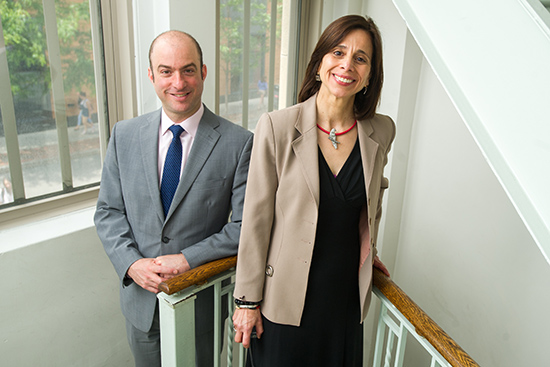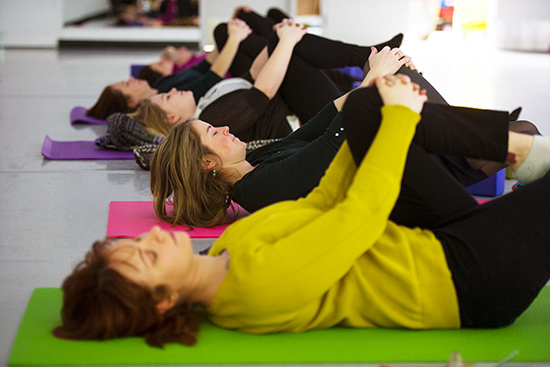Help When Needed: Managing Conflict
BU’s Ombuds: a place to turn when you don’t know where to turn

University ombuds Francine Montemurro (right) and associate ombuds Adam Barak Kleinberger offer a safe, confidential place for members of the BU community to discuss University-related problems. Photo by Cydney Scott
This is part four in a series about Boston University services available to faculty and staff to help with work-related and personal issues.
Workplace conflicts can take many forms: an employee who has a problem with a supervisor, a supervisor who has an issue with someone’s performance, disputes among colleagues, and concerns about career progression: Am I going to get the promotion I believe I’m due? Am I going to be fired? How do I work with my new boss or advisor?
Fortunately, there’s a place on campus that offers a confidential, independent, informal, and impartial environment for people with these and other concerns. It’s the BU Office of the Ombuds, and its services are free and available to all members of the BU community. All conversations are private and off the record.
“On a very basic level, we discuss concerns, help people get the information they need, and help them solve the problem,” says University ombuds Francine Montemurro. “We help identify the underlying causes of the conflict, and we help individuals and groups manage disputes.”
The Office of the Ombuds operates on both the Charles River Campus and the Medical Campus and is staffed by Montemurro and associate ombuds Adam Barak Kleinberger, who both have extensive backgrounds in conflict resolution, negotiation, and mediation. It’s purpose is to be a first step to resolving problems, especially if someone is unsure about where to turn for help. Participation is voluntary, and visitors don’t have to use their real names.
“Sometimes people walk in and they’re not even sure what to call their concern,” says Montemurro. “They need to get some perspective around the issue they are facing before they’re comfortable bringing it to the attention of anyone else. So we spend a lot of time listening very deeply to their experiences and perspectives. We help identify what’s at stake for them and what may be at stake for others. Then we help them brainstorm ways for moving forward.”
Moving forward can take many forms, from having a thoughtful, but difficult, conversation with a coworker to filing a formal grievance with the appropriate office. Each situation is unique, so the ombuds tailor their approach for each person.
The office provides informal assistance only: the staff does not make decisions or determine policy for the University and cannot be called to testify in formal or legal proceedings. And because ombuds are third-party neutrals, they don’t take sides in a dispute. Rather, they try to consider the interests of all parties and find mutually agreeable solutions.
“Our job is not to take in complaints, but to help individuals develop options for addressing their concerns,” says Montemurro. “It could be a concern about a policy or practice, a work relationship, fraud, abuse, or regulatory or safety issues. The first thing we want to know is what’s happened, from your point of view. And then we need to know what you would like to see happen, and we work from there.”
Visitors often arrive anxious, unsure of what they’re getting into, afraid of the possibility of being perceived as a troublemaker for raising a concern in the first place. “Often, people need a confidential place to explore how a difficult situation might play out,” says Kleinberger. “Sometimes a visitor might ask, ‘Where would I go if I wanted to do something formal? Who am I likely to talk to? What might they ask of me? How long is their process?’”
If someone has already talked with a peer, employee, or supervisor, but it didn’t resolve a situation, Montemurro and Kleinberger can discuss whether or not to try again. Asking questions, Kleinberger says, is often helpful: “We might say, ‘Well, you’ve talked to them, it didn’t go well the first time,’ or ‘You didn’t get what you wanted. We could work on ways to communicate your interests,’ or ‘Do you feel like you might want another opportunity to explain the situation? We could try to help you plan a way to do that.’”
Because the office functions as a neutral party, it doesn’t represent an individual—or the University—the way a lawyer or a union steward would. Rather, Montemurro and Kleinberger are sounding boards, sometimes playing devil’s advocate, to help the person think things through and come up with different options. “This is where the creative thinking comes in—from doing nothing at all to filing a formal complaint if that’s what you want to do—and things in between,” says Montemurro. For people who decide to file a formal complaint, they let them know what procedures to follow.
Sometimes the ombuds find that a particular policy or process can lead to repeated problems or unintended consequences. One of their goals is to bring patterns of concern to the University’s attention. “We communicate themes, not personally identifiable information,” Montemurro says. “The office may see practices, policies, or issues that appear to be a cause of systemic problems at BU, and we may bring those to the attention of senior leadership as a preventive approach, but only in cases where it can be accomplished without attribution.”
Visitors come to the Office of the Ombuds for help with issues like work equity, office politics and workplace climate, and health and life safety, for guidance about how to have difficult conversations with coworkers or a boss, and with concerns about intellectual property and unethical or inappropriate behavior. The office typically handles close to 400 cases annually—a number that increases each year.
Montemurro says that an integral part of their work is “preventive medicine.” She and Kleinberger offer workshops, available for any group or department, on how to have difficult conversations, how to negotiate, and how to have an effective feedback conversation. And they provide mediation for people who would like a neutral third party in attendance to help facilitate a difficult conversation.
“I like to think of our office as an office of first resort,” Montemurro says. “The idea is to try to get to the problem as early as you can, when it’s still manageable. It’s never too early to raise a concern. If you want to bounce something off us, we’re more than happy to do that. We’ll never say, ‘Oh, we don’t want to talk with you about that because it’s too little.’ We want to hear from you.”
The Boston University Office of the Ombuds on the Charles River Campus is at 930 Commonwealth Ave., phone 617-358-5960, and on the Medical Campus is in the Solomon Carter Fuller Building, 85 East Newton St., Suite 818, phone 617-638-7645.
This Series
Also in
Help When Needed
-
September 16, 2016
Help When Needed: Equal Opportunity Office
-
September 13, 2016
Help When Needed: Family Resources Office and Children’s Center
-
March 30, 2016
Help When Needed: Faculty & Staff Assistance Office
